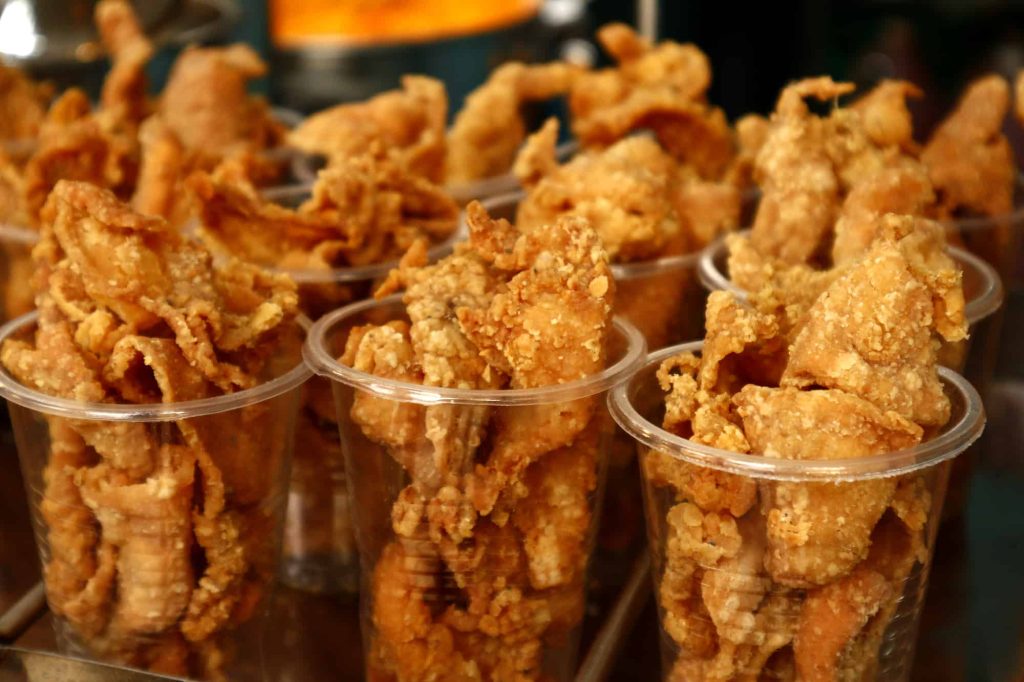Some people consider it to be unhealthy, but it’s undeniable that chicken skin is also delicious. Have you ever wondered what makes it that way?
Chicken skin is delicious for several reasons. In this article, we will discuss seven of these factors: fat content, fatty flavor, social and cultural factors, chicken breeding practices, human tastes and preferences, cooking methods, and the addition of seasonings and other flavors.
Generally speaking, we like chicken skin because it is a fatty food, but there are other factors at play as well. Here are seven reasons chicken skin is so hard to resist.
1. Chicken Skin Is Rich in Fat
According to a study, the tastiest and most appetizing foods are those that are calorie-dense and high in fat (source: Journal of the American Dietetic Association). Energy-rich foods are associated with tasting good, primarily due to their fat content.
Some people are also attracted to energy-rich fatty foods like chicken skin because these foods provide energy for the whole day. In addition, they give satiety and satisfaction after consumption (source: Fat Detection: Taste, Texture, and Post Ingestive Effects).
2. Fat Tastes Good
Fat is known to modify the flavor of foods (source: Clinical Trials). Foods that are abundant in fats, like chicken skin, are likely to be more flavorful. This heavily influences our eating pleasure (source: Journal of the American Dietetic Association).
The “taste” of fat that we are all so familiar with is caused by its overall flavor, smell, and palatability. Fat also affects the texture, smell, and taste of other foods (source: Fat Detection: Taste, Texture, and Post Ingestive Effects).
3. Social and Cultural Factors
We tend to like fatty foods because they taste good. A recent study found that when we are children, we tend to prefer foods high in fat, as well as sweet foods.
Our genetic makeup, metabolic requirements, behavioral or emotional considerations, sociocultural values, and economic factors can all affect our preference for fatty foods like chicken skin (source: Fat Detection: Taste, Texture, and Post Ingestive Effects).
4. Chicken Breed, Diet, and Aging
Indigenous breeds, corn-based feeds, and young chickens almost always taste better than commercial broilers and other breeds, chickens fed with fish meal, and old chickens, as confirmed in a recent study (source: Asian-Australasian Journal of Animal Sciences).
Although the study is about chicken meat, the skin is attached to the meat in live chickens and could be affected by these factors in terms of palatability.
5. Universal Human Preference
Whether supported by science or not, we can all agree that fatty foods almost always taste good. And humans tend to favor flavor, smell, and other properties that make our senses twinkle over the nutrient content of a food.
Children will more likely prefer fries over steamed broccoli, fried chicken with skin over grilled fish, and chips over baby carrots. The same is true for adults.
6. Method of Cooking
Chicken skin is perhaps most commonly known as fried food, but it can also be roasted, added to soups and sausages, or rendered to use the fat for other purposes.
If you’re looking for some great ways to use leftover chicken skin, check out this article here.
You might think that fried and roasted chicken skin would taste better than its boiled counterpart. However, fried or roasted chicken skin and boiled chicken skin each seem to offer different aromas and flavors, so it really comes down to personal preference.
In a recent study on chicken meat, roasted, fried, grilled, or pressure-cooked chicken was shown to contain compounds called pyrazines, thiazoles, and oxazoles, which are responsible for the roasted flavor.
On the other hand, boiled chicken contains the heterocyclic compounds thiophenes, trithiolanes, trithianes, which are responsible for the onion-like and meaty aroma and flavor.
For grilled chicken, the Maillard reaction might be responsible for its aroma and taste (source: Asian-Australasian Journal of Animal Sciences). This is a chemical reaction between sugars and amino acids that results in the delicious browning you get on grilled chicken and chicken skin.
7. Seasonings and Added Flavors
Chicken skin is delicious on its own, but seasonings and flavor additives can elevate its flavors even more!
For example, ready-made chicken seasoning is usually made with fresh ground pepper, salt, paprika (smoky or sweet), cayenne pepper, garlic powder, onion powder, dried thyme, basil, rosemary, and parsley.
Most people love this combination of herbs and spices for their chicken, and it also works great for chicken skin!
Chicken skin sometimes gets a bad rap because of its fat and cholesterol content, which is why we also recommend eating it moderately and infrequently. Now you know seven reasons why it’s so irresistible!



